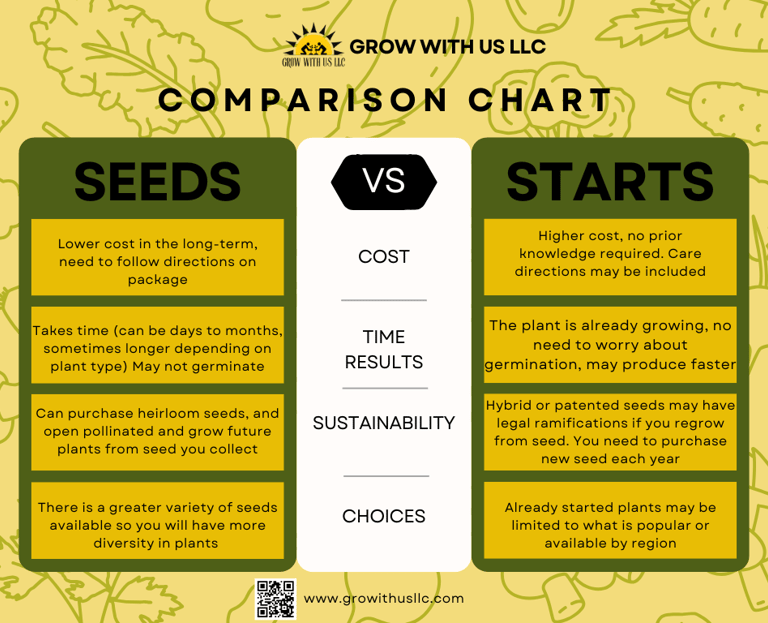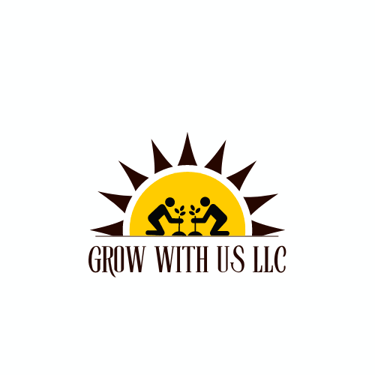Starting Your Garden: Seeds vs. Starter Plants
Seeds or Starts? Whether you’re all about DIY or looking for quick wins, this guide helps you choose the growing method that fits your time, space, and style. Spoiler: there’s no wrong answer, just what works best for you. #UrbanGardening #BeginnerGardener #GrowYourOwnFood #SeedStarting #StarterPlants #GardenTips #LetsGrowTogether #GrowWithUs #SmallSpaceGardening #ContainerGardening #GardeningForBeginners
BEGINNING GARDENINGEDIBLE PLANTSHOW TO GUIDESGARDEN PLANNING


Seeds or Starts? Finding Your Garden Style
So, you’ve decided to grow something, yay, good for you! But now you’re standing in the garden aisle wondering: Should I grab seeds or baby plants and get going? Don’t worry, there’s no “right” way, just the way that works best for you.
Let’s talk about your garden personality (yes, that’s a thing!).
Are You a Seed-Starting Type?
If watching things grow from scratch, rolling up your sleeves, and experimenting are things you enjoy, seed starting might be for you. It takes more time and patience, but it’s also pretty amazing to witness the full life cycle of your plant.
Seeds are also:
Less Expensive (a packet for $2–$5 can grow you a whole row)
Great for variety—more choices than what you’ll find in stores
A good way to share and save seeds with your community
Seeds do come with some preparation. You’ll need:
Pots or trays
Good soil
Light (a sunny windowsill or grow light)
A sprinkle of patience
Thinking about growing from seed? Here's something new gardeners don’t always hear:
Not all seeds are created equal.
There are open-pollinated seeds (like heirlooms), which you can save and replant year after year—perfect for folks who like to stretch a dollar and keep their options open. These seeds help preserve plant diversity and adapt well to local conditions.Then there are patented or hybrid plants, which usually can't be legally saved or shared. They’re often bred for specific traits like disease resistance or high yield, but that convenience comes with limits (and sometimes licensing).
Bottom line: If you want full freedom to reuse seeds, grow your collection, and explore fun, unique varieties, open-pollinated seeds are the way to go.
Team Starter Plant?
Maybe you’re short on time, space, or brain bandwidth, and that’s okay! Starter plants (aka seedlings) are ready to transplant and give you that “I’m already winning” feeling.
They’re great because:
You skip the tricky sprouting stage
You get a visual payoff fast
You can jump straight into watering and harvesting
Starter pants (seedlings) cost more. Around $3–$10 per plant. That adds up, especially if you're planting several types.
What About Cost?
Let’s break it down:
Seeds are cheaper upfront and give you more plants, but you may need supplies, which raise costs.
Starts cost more individually, but they save you time and hassle.
Either way, growing food is usually more affordable than buying it, especially if you save seeds or compost later.
You don’t have to go all-in either way. Mix it up! Grow basil and lettuce from seed, and grab a tomato start if you’re running behind. There’s no one-size-fits-all in the garden.
How Fast Will I See Results?
Seeds: Take time. Some sprout in a few days (like radishes), others take weeks (like peppers). Harvest can take a few weeks to months.
Starter Plants: You’ll be eating sooner! They’re already established and just need time to root and grow.
If you’re growing to eat now, go for herbs or leafy greens—they’re fast, whether from seed or start.
Real Talk: What's Your Gardening Vibe?
Ask yourself:
Am I excited to learn and experiment? → Try seeds.
Do I want easy wins and less stress? → Go with starts.
Is saving money or seed swapping important to me? → Seeds again!
Do I want to actually eat soon? → Starts will get you there faster.
Bonus Tip: Think Space, Soil, and Pests
Small space? Seeds give you flexibility—microgreens, herbs, and cut-and-come-again lettuce are perfect for porches.
Soil not great? Use containers or raised beds. Make sure whatever you grow has room and drainage.
Pests a pain? Both seeds and starts can get nibbled—use row covers or grow plants that naturally repel bugs (like basil or mint!).
Final Word
Whether you’re Team Seed or Team Starter Plant, the most important thing is that you get growing. Your garden doesn’t need to be perfect—just planted. Start with what you’ve got. Learn as you go. And remember: You’re not just growing food. You’re growing you.


